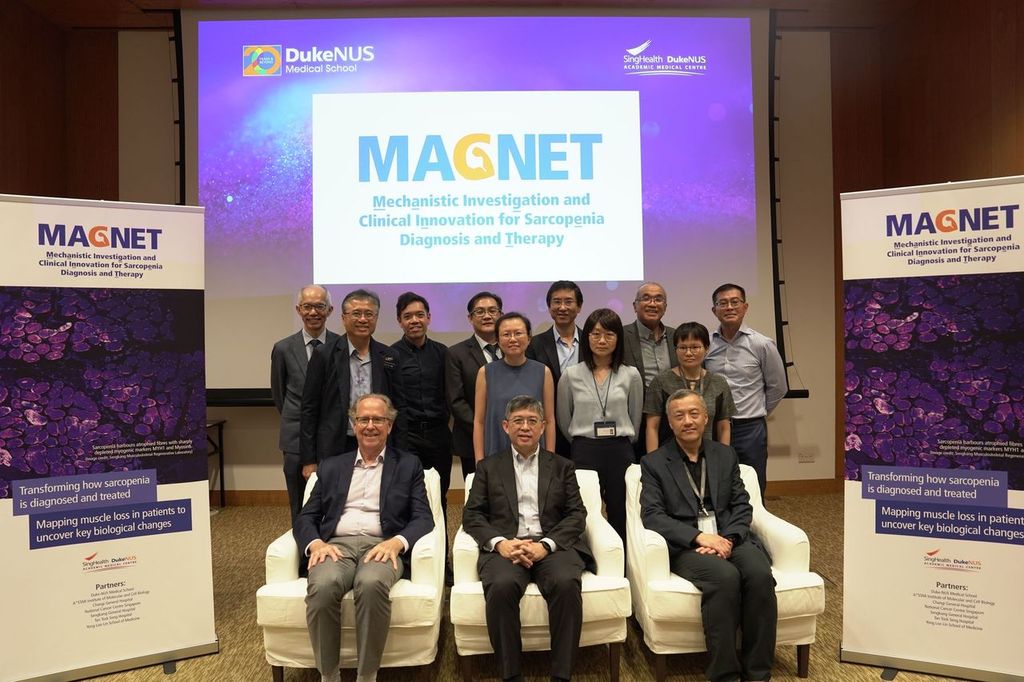
Image Credit: Duke-NUS
Caption: (seated, from left) Professor Thomas Coffman, Dean, Duke-NUS Medical School; Professor Kenneth Mak, Director-General of Health, Ministry of Health; Professor Wang Yibin, Corresponding Principal Investigator of the MAGNET Programme and Director of the Cardiovascular & Metabolic Disorders Programme at Duke-NUS Medical School. They are joined by healthcare leaders and the MAGNET theme Principal Investigators // Image credit: Duke-NUS Medical School
To tackle the growing threat of muscle loss in Singapore’s ageing population, SingHealth Duke-NUS Academic Medical Centre will spearhead a S$10 million research initiative into sarcopenia—marking the country’s first comprehensive, large-scale programme focused on this condition marked by loss of muscle mass and strength.
The MAGNET initiative is officially launched on August 4, 2025. The event featured Professor Kenneth Mak, Director-General of Health at the Ministry of Health, as the Guest-of-Honour and keynote speaker, marking a significant milestone in advancing healthcare innovation.
The MAGNET initiative will incorporate cutting-edge AI, genomic and molecular technologies while leveraging the largest Asian-focused clinical cohort of sarcopenia patients, alongside a unique biobank of muscle and serum samples.
MAGNET aims to achieve its objectives in four ways:
This nation-wide initiative brings together a consortium of scientists and clinicians not only from Duke-NUS, Changi General Hospital, National Cancer Centre Singapore, Sengkang General Hospital and Tan Tock Seng Hospital, but also all public healthcare institutions from the three healthcare clusters—National Healthcare Group, National University Health System and SingHealth. The initiative also involves key academic and research institutions, namely A*STAR Institute of Molecular and Cell Biology, the Life Sciences Institute Immunology Programme at National University of Singapore (NUS), as well as the Immunology Translational Research Programme at NUS Yong Loo Lin School of Medicine.
Supported by the National Research Foundation, Singapore under the National Medical Research Council (NMRC) Research, Innovation and Enterprise 2025 Open Fund - Large Collaborative Grant (OF-LCG) programme and administered by the Singapore Ministry of Health through the NMRC Office, MOH Holdings Pte Ltd, the project—named MAGNET (Mechanistic Investigation and Clinical Innovation for Sarcopenia Diagnosis and Therapy)—will position Singapore as a leader in sarcopenia research globally and is expected to bring critically needed innovations to how the condition is detected and treated, particularly among Asian patients.
Professor Wang Yibin, Corresponding Principal Investigator of the MAGNET Programme and Director of the Cardiovascular & Metabolic Disorders Programme at Duke-NUS Medical School, said: “The health burden of sarcopenia is growing rapidly as our society ages, yet we are still in the early stages of understanding how it develops and how best to treat it. With MAGNET as Singapore’s first nationwide research initiative dedicated to this disease, we are bringing together the country’s leading minds and capabilities to deliver breakthroughs in both science and care.”
Professor Teh Bin Tean, one of the MAGNET programme theme Principal Investigators and Deputy Chief Executive Officer (Research) of National Cancer Centre Singapore, said: “Still, by harnessing the most advanced technological platforms to carefully unravel sarcopenia’s underlying biology, we are poised to uncover new diagnostic markers and therapeutic targets—driving earlier detection, more effective treatments and advancing precision medicine for better patient outcomes.”




